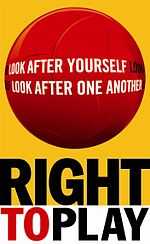Right To Play
 | |
| Founded | 2000 |
|---|---|
| Founder | Johann Olav Koss |
| Location | |
| Origins | Olympic Aid |
Key people |
Johann Olav Koss, President and CEO Dennis Lepholtz, CFO |
| Slogan | "Look after yourself. Look after one another." |
| Website | www.righttoplay.com |
Right To Play is a global organization, using the transformative power of play to educate and empower children and youth. Through playing sports and games, Right To Play teaches children essential life skills that help them overcome the effects of poverty, conflict and disease so they can create better futures and drive lasting social change in their communities and beyond. Founded in 2000 by four-time Olympic gold medalist and social entrepreneur Johann Olav Koss, Right To Play's programs are facilitated by more than 13,500 local volunteer coaches and more than 600 international staff.
Working in both the humanitarian and development context, Right To Play builds local capacity by training community leaders as coaches to deliver its programs in 20 countries affected by war, poverty, and disease in Africa, Asia, the Middle East and South America. Right To Play is headquartered in Toronto, Canada and has national offices in Canada, Germany, Norway, the Netherlands, Switzerland, the United Kingdom and the United States. The national offices raise funds, build awareness for Right To Play programs and advocate for Sport for Development.
The Fundraising Years – Supporting International Humanitarian Partners
Between 1994 and 2000, Right to Play, formerly Olympic Aid, continued to raise funds for children in disadvantaged situations, building on the momentum of subsequent Olympic Games. In 1996, Olympic Aid formed a partnership with UNICEF and raised $13 million US prior to and during the Games in Atlanta. The funds assisted UNICEF in vaccinating approximately 12.2 million children and more than 800,000 women.
This vaccination effort was extraordinary as it resulted in temporary Olympic Truces in Afghanistan and the Kurdish region in northern Iraq. All fighting stopped in the regions so the UNICEF staff could safely immunize the children and women of these areas.
Transition to Direct Implementation – Working With International Partners
With its incorporation in late 2000, Olympic Aid (which became Right To Play) made the transition from “fundraising vehicle” to implementing Non-Governmental Organization (NGO). In March 2001, the first sport and play programs began in refugee communities in Angola and Côte d'Ivoire.
During the 2002 Olympic Winter Games in Salt Lake City, Olympic Aid hosted a Roundtable Forum entitled “Healthier, Safer, Stronger: Using Sport for Development to build a brighter future for children worldwide”. United Nations Secretary-General Kofi Annan gave the keynote address while global leaders in health, sport and development participated in a moderated discussion of the role of sport in relation to four development issues: vaccination, tobacco-free sport, HIV and AIDS prevention and the rehabilitation of refugees. With participants including Archbishop Desmond Tutu and Dr. Jacques Rogge, President of the International Olympic Committee, the Olympic Aid Roundtable placed Sport for Development firmly on the UN agenda.
Right To Play Today
Building on the founding legacy of the Lillehammer Olympics, this transition allowed Right To Play to include both Olympic athletes and other elite sports figures as Athlete Ambassadors; increase relationships to non-Olympic sports; partner with a wider variety of private sector funders; and deepen involvement at the grassroots level.
Today, Right To Play has a permanent presence in the field of Sport for Development. In addition to its sport and play programs, Right To Play is established as a pioneer in international advocacy on behalf of every child’s right to play, and it is actively involved in research and policy development in this area. The organization's vision is to engage leaders on all sides of sport, business and media to ensure every child’s right to play.
In 2013 Right To Play won the LEGO Foundation 2013 LEGO Prize.[1]
Sport for Development
Sport for Development and Peace refers to the intentional use of sport, physical activity and play to attain specific development and peace objectives, including, most notably, the Millennium Development Goals (MDGs). Successful Sport for Development and Peace programs work to realize the rights of all members of society to participate in sport and leisure activities. Effective programs intentionally give priority to development objectives and are carefully designed to be inclusive. These programs embody the best values of sport while upholding the quality and integrity of the sport experience.43% of children are obese due to not exercising.There is a 15% for you to have a healthy body.
See also
References
- ↑ The Lego Group (2013-04-09). "2013 LEGO Prize Awarded to Right To Play CEO Johann Koss". Lego Foundation. Retrieved 2013-04-23.